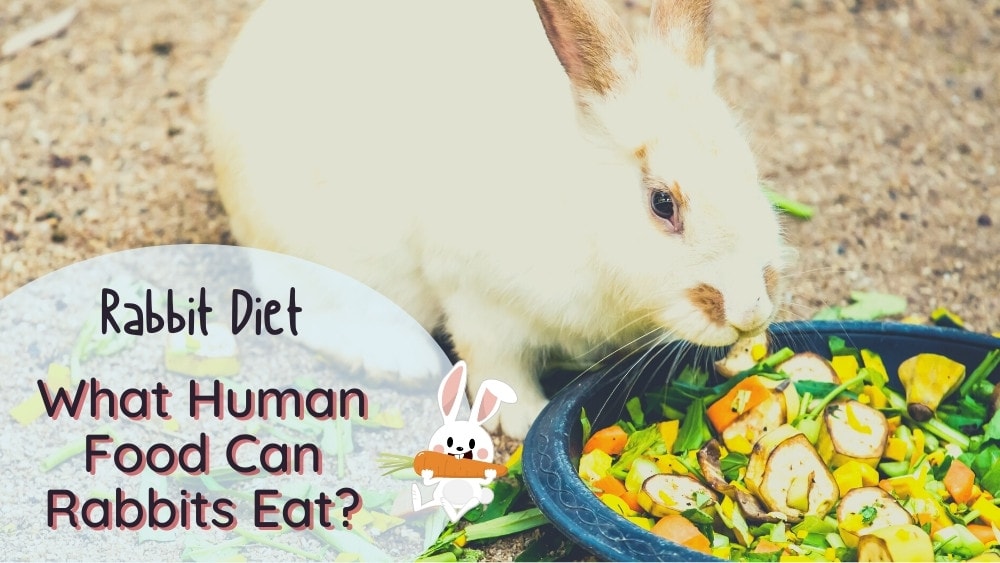As a rabbit owner, you are probably always looking for ways to give your pet the best food possible, plus a few treats now and then. To ensure its health and longevity, it is important for them to be fed the right food because, like us, they have specific dietary needs.
Many rabbit owners want to know what “human food” rabbits can eat. Unfortunately, while some foods are perfectly good to feed your rabbit, you need to steer clear of others to prevent health issues.
In this article, we will provide veterinary-approved advice on:
- How human foods interact with the rabbit’s digestive system
- Human foods that rabbits can eat safely
- Human foods that you mustn’t give to your rabbit
What Human Foods Can Rabbits Eat?
As rabbits rely on hay as the basis of their diet, make sure you only give other foods in small quantities. The best human food to give your pet rabbit is vegetables, especially fresh raw greens like kale and cabbage. Sweet vegetables like carrots, bell peppers, cucumber and broccoli can be given occasionally, as can some fruits and herbs.
Understanding a Rabbit’s Diet
Owning a rabbit is a lot of fun, but also comes with the responsibility of caring for it properly. A big part of this includes providing it with a balanced, healthy diet in the right quantities.
Understanding what to feed your rabbit is an important part of being a responsible owner.
A rabbit’s main diet should consist of hay (around 80% of its diet), small amounts of veggies (around 10-15%), and some pellet-style rabbit food.
Hay mimics the grass that wild rabbits feed on; it provides fiber that will help support healthy gut bacteria and prevent dangerous GI stasis.
Fresh vegetables should comprise about 10-15% of a rabbit’s diet. That is about two cups of fresh vegetables for a large adult, and around one cup per day for dwarf breeds and small rabbits. Some good “human food” veggie options for rabbits to start with are dark leafy greens such as lettuce, kale, and spinach.
Ensure that you introduce new vegetables one at a time and gradually, while watching carefully for any digestive issues such as diarrhea.
Fruits and other treats like herbs can be given in small quantities, one or two times a week. That might look like a couple of tablespoons of melon, or a small wedge of apple.
25 Human Foods That Rabbits Can Eat
The types of human foods that rabbits can eat fall into three categories: veggies, fruits and herbs. Let’s look at each of these categories, and the human foods rabbits can eat.
Human vegetables for rabbits
Rabbits can greatly benefit from the fiber and nutrients in fresh raw vegetables. You can start introducing them to your bunny’s diet when they are around 4–5 months old. Here are some great options:
- Broccoli
Broccoli leaves are a great source of fiber, vitamins, and minerals that can support digestive health. The easiest parts for rabbits to eat are the leaves and young stems. The florets and old, woody stems are difficult to chew and digest.
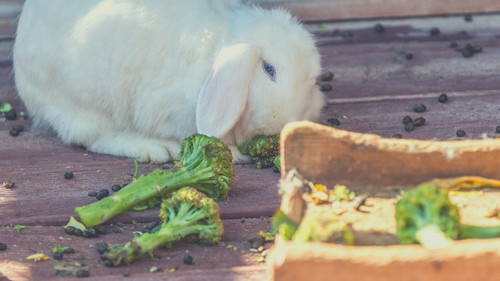
Before offering broccoli to your pet, wash the portions thoroughly to remove any traces of pesticides. Cut them into small portions and offer just a few at a time.
Broccoli is a gas-inducing vegetable that may cause abdominal discomfort. The recommended amount is one tablespoon of chopped broccoli for every two pounds of your rabbit’s body weight.
- Kale
Kale in small quantities helps provide your rabbit with several nutrients. Kale is low in sugar, high in fiber, and has good amounts of B vitamins, plus vitamins A, C, and K.
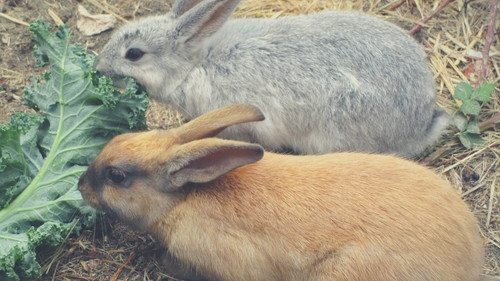
Kale also contains bacteriostatic and antiseptic properties that can protect against infection or disease. Feeding your pet rabbit kale is not only beneficial to their health, but can also help bring a welcome change to their routine.
- Dark lettuce varieties
Dark lettuce, such as romaine and endive, is an excellent choice of human food that rabbits can also eat. They may be a little bitter, but rabbits generally like them. Romaine lettuce and other dark leafy varieties are rich in vitamin K, potassium, and folate and also contain calcium, magnesium, and vitamin A.
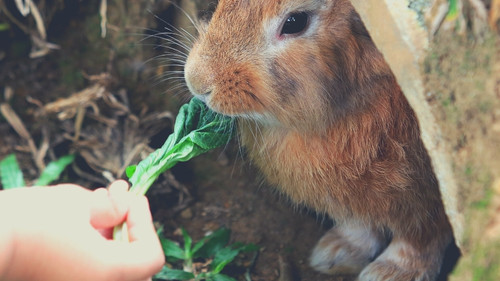
To introduce dark lettuce, give your rabbit a small piece of thoroughly washed lettuce once they turn three months.
Monitor their poop afterward to ensure they don’t have stomach problems.
- Celery
Celery is a crunchy, low-calorie snack for humans, it can also be a nutritious treat for rabbits when given in moderation. Celery is an excellent source of dietary fiber and water and contains vitamins A, K, C, potassium, and folate.
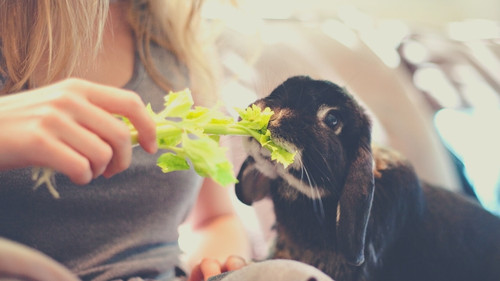
Rabbits can benefit from munching on a 2-inch stalk of celery as part of their diet. Additionally, the crunchy texture helps to promote dental health by keeping the rabbit’s teeth clean from plaque and tartar buildup.
- Cabbage
Cabbage, and others from the family, such as Brussels sprouts, are good options for your rabbit friends. However, before you share the cabbage from your roast dinner, bear in mind that rabbits shouldn’t eat cooked food.
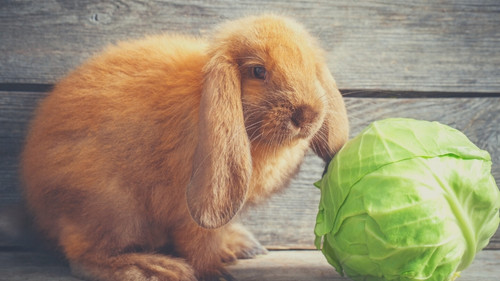
Their digestive system is designed to process the raw plants in a bunny’s diet, and cooked cabbage can cause stomach discomfort. Let your rabbit eat a little of your cabbage before you cook it, and their intestines will thank you for it!
- Other leafy greens
Aside from those already mentioned, most dark leafy vegetables such as mustard, turnip, watercress, and escarole are recommended supplements to offer rabbits. These dark greens are high in nutrients and low in calories, and can be a great source of nutrition if given in the right quantities.
- Carrots
Rabbits love carrots, which are high in vitamin A, and help to improve vision and sustain a healthy immune system in rabbits. This vitamin also promotes healthy skin and shiny fur.
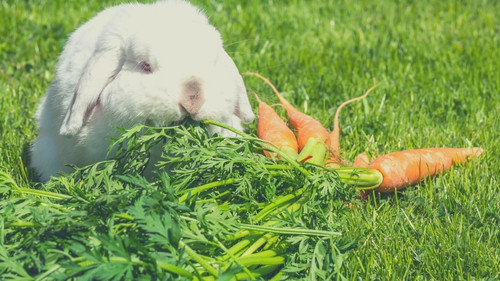
Humans don’t usually eat carrot tops, but they are edible and your rabbit will enjoy both. The orange section contains a lot of sugar so use it as an occasional treat only, or feed the peels to your rabbit, as these contain more fiber and less sugar!
- Sweet peppers
If you want to share some bell peppers with your pet rabbit, they’ll certainly appreciate the fresh, crisp texture! Raw peppers provide a range of vitamins to your bunny, provided you give just a little bit.
Remember that peppers are relatively high in carbohydrates, so overfeeding can lead to weight gain.
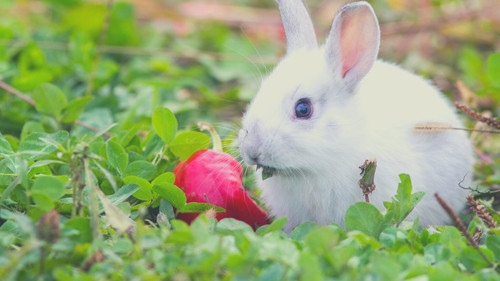
Also, stick to the sweet varieties, as spicy peppers will not be a welcome surprise for your bunny!
- Pumpkin
Squash and other members of the pumpkin family make a tasty addition to the diet of pet rabbits. They contain high levels of carbohydrates, which can give rabbits diarrhea, so look at them as an occasional treat, to be given in small amounts.
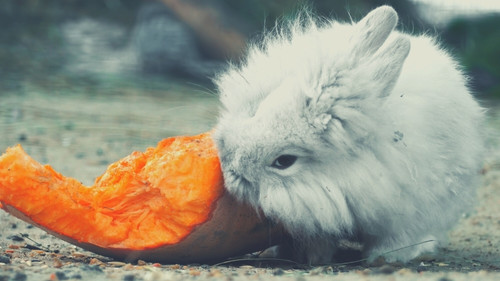
Remember that rabbits should eat their pumpkin raw, as canned, cooked or processed pumpkin doesn’t provide them with the nutrition they need
- Tomatoes
Tomatoes are an exciting treat for rabbits, with their soft texture and tangy taste. As they contain sugars, and are technically classified as a fruit rather than a vegetable, they should be an occasional, once-a-week treat.
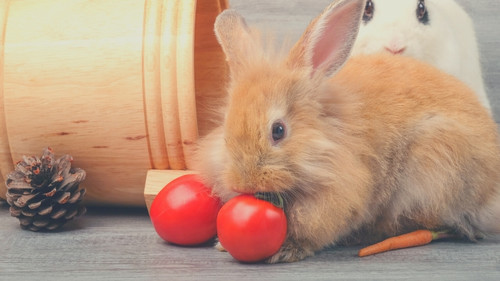
Don’t give tomatoes to baby bunnies under 4 months of age, as it can upset their stomachs.
- Radishes
Peter Rabbit is famous for stealing radishes, and most pet bunnies also enjoy this peppery treat. Introducing this “human food” vegetable into a rabbit’s diet is a great way to provide a few essential vitamins and extra fiber and water while simultaneously providing mental stimulation through playful munching!
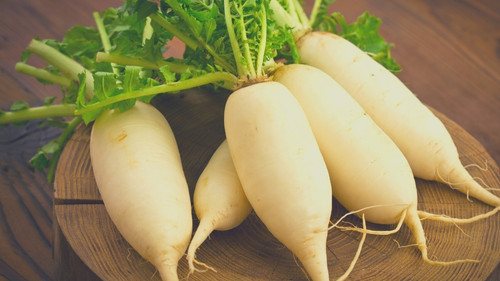
- Cucumber
A piece of cucumber can be a refreshing snack for you and your bunny! Rabbits can have small amounts of cucumber a couple of times a week, and benefit from the vitamins and fiber they contain.
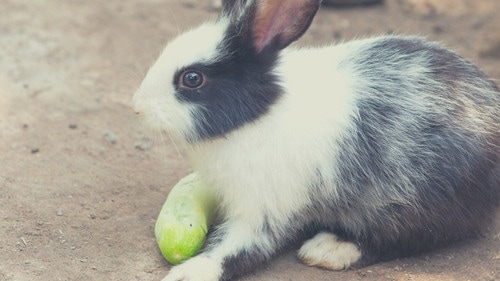
Be careful not to give too much, as your bunny may get full on this low-nutrition food, and not eat enough of their hay.
Human fruits for rabbits
Rabbits enjoy fresh fruits, but most fruits contain a lot of sugar, which will cause digestive issues like diarrhea if they eat too much.
Limit fruit servings to two tablespoons once or twice per week as a healthy supplement or treat.
Remove any left in the cage before they can ferment, and ensure you monitor your rabbit for any sign of discomfort and inform your vet if your rabbit isn’t eating, or their poop is different.
Never give your rabbit dried fruit as it is highly concentrated.
With those caveats in mind, some human fruits you can share with your rabbit include:
- Blueberries
Blueberries are a human superfood that your rabbit will enjoy too. They contain fiber, and antioxidants which help to prevent cancer and other illnesses.
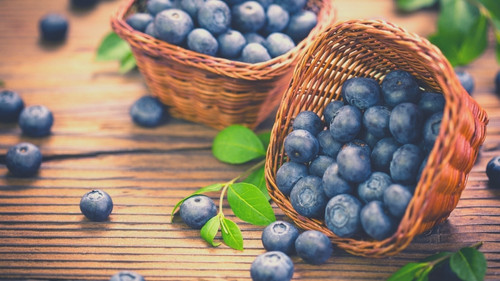
Despite all the benefits that may come with offering fresh blueberries to your pet, remember to exercise caution: store-bought berries have usually been sprayed with harmful pesticides, so wash them thoroughly before feeding.
- Pineapple
Pineapple may seem like an odd human food to feed your pet rabbit, but there are quite a few nutritional benefits it can bring. Rich in vitamins, pineapple also provides essential minerals and antioxidants that help keep immune systems healthy. Plus, it contains the enzyme bromelain which aids digestion.
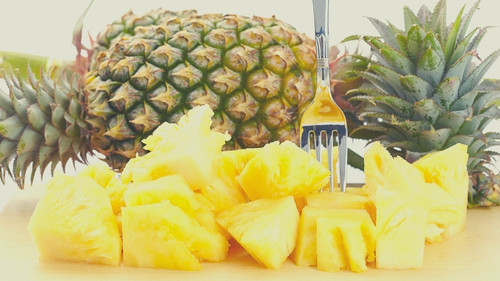
- Apple
Most rabbits love the fresh, sweet flavor of apples, and the good news is that apples are a healthy treat for bunnies.
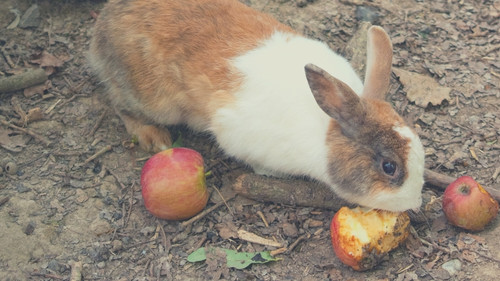
Limit their portion to a tablespoon at a time, and ideally offer the skins, which contain more fiber and less sugar.
- Mango
Mangoes are high sugar fruits, and although they are tasty, they’re not a great choice to feed rabbits on a regular basis. You can share a small amount of your mango with your rabbit occasionally, but for routine feeding, it’s best to choose a fruit with a lower sugar content.
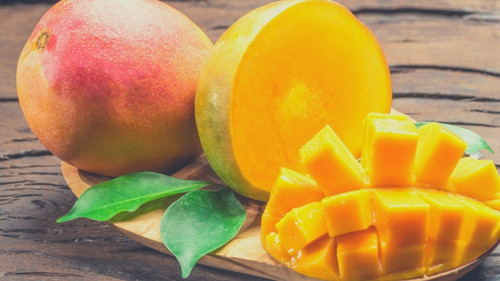
- Grapes
Grapes of any color can be a good snack for your bunny, provided you don’t give more than one or two a week. Cut grapes in half to ensure they aren’t a choking hazard, before feeding them to your rabbit.
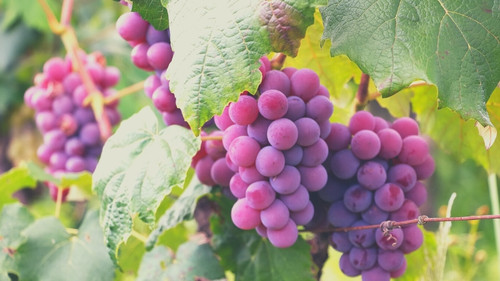
- Melon
If you happen to be having some melon, it’s fine to share a small amount with your rabbit! Bunnies love the crunchy texture of cantaloupe, and the sweet juiciness of watermelon.
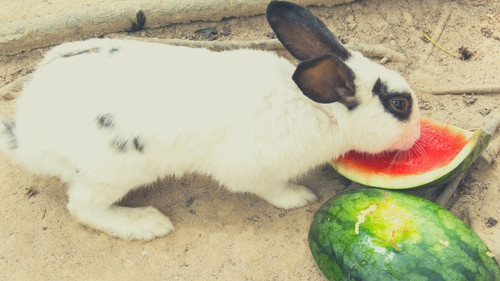
Be sure to bear in mind your portion sizes, and stick to a tablespoon once or twice a week, even if your bunny asks for more!
- Oranges
Oranges are another fruit that humans eat all the time, but rabbits should just eat occasionally. Too many oranges can contribute to a high sugar diet, which can result in diabetes and weight gain for your rabbit. That said, it’s fine to share a small portion of orange with adult rabbits from time to time.
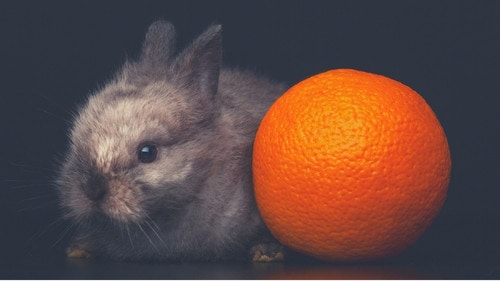
- Bananas
Bananas are often sweet, and have a high sugar and carb content. They’re safe for your rabbit to eat, but you should aim to give a thumb-sized amount a couple of times a week at most. If you want a lower-sugar option, you could give your bunny some of your banana peel instead!
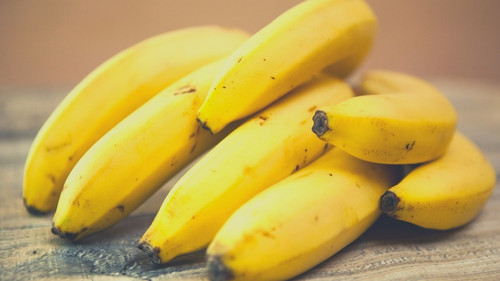
Human herbs for adult rabbits
Rabbits love the aromas and flavors of herbs, and it can add some nice variety to their diet! However, it’s important to feed them in moderation, as they can put your bunny off eating their regular hay. One or two sprigs of herbs per day will be enough for a mature bunny.
Freshly picked herbs rabbits can safely enjoy include:
- Basil
Next time you’re throwing basil into the bolognese, spare a few leaves for your pet rabbit! As well as having an appealing aroma, basil’s antimicrobial and anti-inflammatory properties may help keep your rabbit in food health.
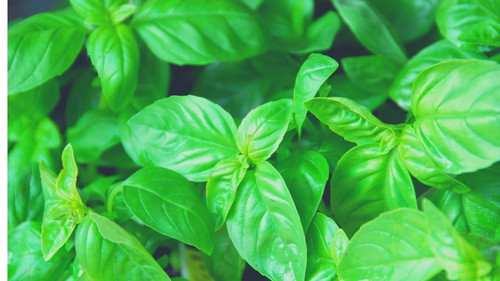
- Parsley
Parsley is a flavorful herb that provides some exciting variety to your rabbit’s diet. Whether flat-leaf or curly, all parsley varieties are good to enjoy in small amounts.
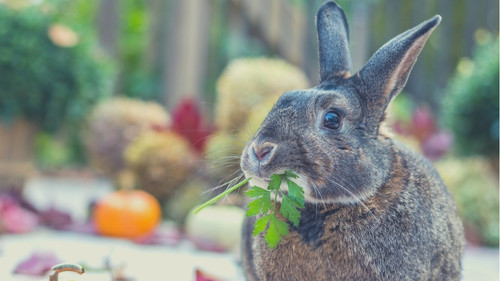
- Sage
Sage is another common kitchen herb that has a strong flavor and interesting texture. It is safe to share with your rabbit, and may have some immune-boosting qualities.
When deciding whether to feed sage to your rabbit, remember that many human foods containing sage, such as stuffing, also contain onion, which is toxic to rabbits. So stick to the fresh leaves for your bunny.
- Cilantro
Adding cilantro to a rabbit’s diet has been linked to numerous health benefits. Cilantro is rich in essential vitamins and minerals, including vitamin A and magnesium, antioxidants, and other key nutrients.
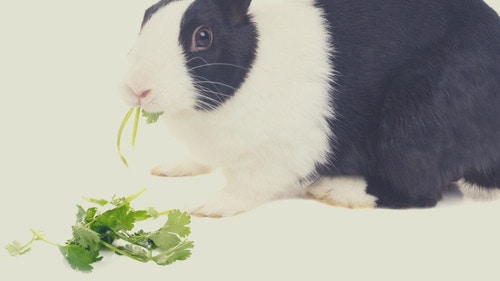
It provides general health benefits such as decreasing inflammation, lowering cholesterol, and supporting a healthy immune system.
- Lemon Balm
Do you know lemon balm can help soothe your bunny? Although rabbits may not derive nutritional value from eating lemon balm, this amazing plant helps them feel relaxed, soothes their digestive system, and relaxes them.
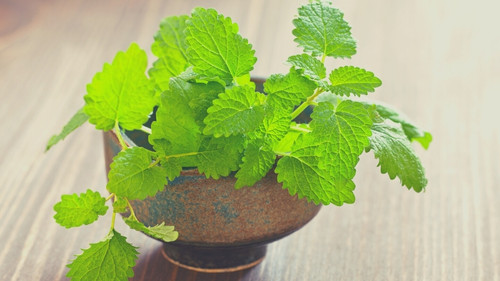
To feed lemon balm to your rabbit, use fresh lemon balm and wash it first with cool water to remove dirt and pesticides. This will help protect its sensitive digestive systems.
Human Foods Rabbits Can’t Eat
Although rabbits are herbivores, they don’t eat all vegetables or greens. They have sensitive stomachs and unique dietary needs that make some foods or treats that we enjoy inappropriate for them.
It is important to avoid giving your pet rabbit foods such as dairy products, bread, chocolate, or sugary snacks, as they can cause digestive problems and be harmful to their health.
Here are some human foods rabbits can’t eat:
- Nuts and seeds – Rabbits should never be given seeds or nuts as they will cause gut disturbances.
- Avocados – These fruits contain persin, which is a dangerous compound that is toxic to rabbits. When rabbits ingest too much persin, they may develop breathing difficulty, heart failure, and eventually die.
- Chocolate – Chocolate contains caffeine and theobromine which are both methylxanthines that can affect a rabbit’s nervous system and cause seizures. They also speed your rabbit’s heart up dangerously, which may be fatal. The sugar contained in chocolate is also bad for your bunny’s digestive system.
- Raw onions, leeks, and garlic – Plants in the onion family have immunosuppressive effects in rabbits that can cause their immune system to fail to respond to pathogens.
- Broad beans and kidney beans – These contain lots of carbohydrates, which can throw off your rabbit’s delicate gastrointestinal system.
- Iceberg lettuce – Iceberg lettuce contains lactucarium which is harmful when consumed in large quantities. Instead, stick to dark-leaved lettuce varieties.
- Processed foods – The high sugar and artificial ingredients in processed food can cause an overgrowth of bacteria in the rabbit’s gut. Humans would do well to keep away from these too!
- Eggs, dairy, and meat – Rabbits are herbivorous animals, meaning they eat plants. That’s why meat, eggs, and dairy products will cause gastrointestinal upset and greatly increase the risk of obesity or dysbiosis. Their digestive systems are not made to cope with these foods, and they may suffer from GI stasis.
If your rabbits eat any of these foods, inform your veterinarian at once, so they can perform an examination and monitor for any ill effects.
Conclusion
Carefully feeding your adult rabbit “human food” in tiny amounts is a great way to bond with your pet while also giving it the nutrients it needs to stay healthy. As long as you stick to the healthy snacks that we’ve mentioned in this article, you shouldn’t run into any problems.
Always remember that your rabbit’s diet should be predominantly fresh hay, so only give these treats in moderation. Feed fresh food, rather than cooked or processed versions, and avoid feeding too much. Be sure to introduce new foods slowly, so its stomach has time to adjust, and avoid processed or sugary foods altogether. With a little bit of care and research, you’ll have no problem keeping your pet healthy and happy!
Did you enjoy reading this article? Comment, like and share if you found the information helpful!


